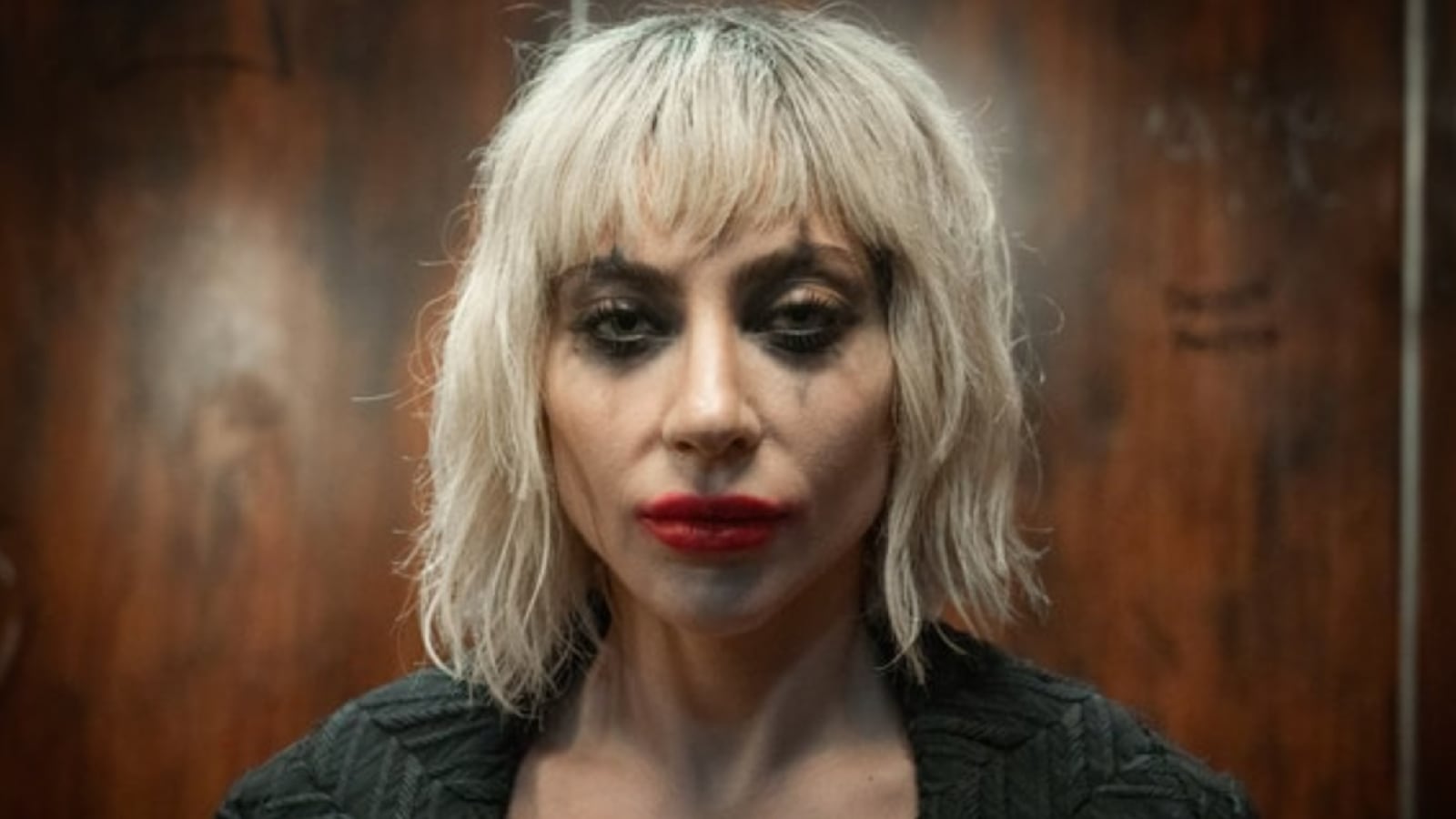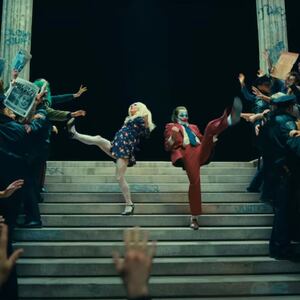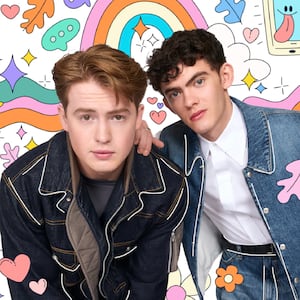Just five years ago, Lady Gaga and Glenn Close were in a tight race of Best Actress. Olivia Colman would spoil the face-off—but not before Gaga could win her own statue and capture headlines with a yearning performance of “Shallow”. Now, with Joker: Folie à Deux, one has to wonder whether Gaga will make it to the Oscars again.
Folie à Deux landed with a thud. It cratered at the domestic box office, pulling in a meager $37.8 million, $10-20 million behind expectations. Worse, it received a CinemaScore of a D, reflecting the general distaste for the surprisingly boring, hodge-podge film. Given the alt-right internet bro fervor of the last Joker, many cinemas were expecting a blowout. The Boston Common AMC had its costume policy planted in the middle of its entrance. But the fanboys didn’t show—the theater, half empty, was mostly older couples.
The film’s failure is bad news for Gaga, who’s still nascent in her acting career. In just three films, she’s moved from prestige inductee to critically derided. Back in 2019, Gaga was a beacon of optimism for pop stars looking to make the jump; now, she’s stuck in a creative rut. Worse yet, other radio mainstays like Selena Gomez and Ariana Grande are placed squarely in the Oscars dialogue this year, while Gaga lags behind. It’s sent dozens of gay men into a tailspin, acting as would-be managers planning her next moves.
How’d we get here? It all dates back to A Star is Born, Gaga’s nose-tracing, makeup-rejecting smash hit.

Bradley Cooper and Lady Gaga in A Star Is Born
Warner Bros. PicturesThe material was close to home: Ally Maine shot up to fame quite suddenly, as Gaga did with “Just Dance.” Barbra Streisand, who starred in the film’s previous iteration, is something of a less experimental Gaga. Streisand is also a native New Yorker, like Gaga (though not “New York Italian”). Better yet, Gaga got to show off her chops in some striking ways, lighting an emotional match with her final “I’ll Never Love Again.” That’s also cut from the Babs’ cloth, with shots resembling Streisand’s turn: Gaga’s close-up, slow-moving tears resembling the gut-wrenching “My Man” in Funny Girl. Streisand was able to pair her booming singing career with a knack for film. Could Gaga follow?
With its ties to Streisand’s 1976 iteration (and Judy Garland’s 1954 take), A Star is Born also allowed Gaga to channel the trappings of Old Hollywood. She arrived in Venice for the film’s premiere via boat, an entrance almost as dramatic as her costume changes for the following year’s Met Gala. She schmoozed with reporters, waxing poetic time and time again about how “there can be 100 people in the room.” She crooned romantically at the Oscars while staring Bradley Cooper deep in his eyes, inspiring a tabloid frenzy. Sure, Gaga didn’t win the Best Actress award, but she proved herself to the dismissive gargoyles of the Academy.
Following A Star is Born, Gaga took a notoriously variable bet: Working with Ridley Scott. The director was on a losing streak, fresh off All the Money in the World and Alien: Covenant. Still, he was taking a big swing, adapting a befuddled business book tracking the Gucci empire into a true crime epic. Gaga sank her teeth into the dramatics of murderous Patrizia Reggiani, and got to use her (solid!) Italian accent. And the meme potential was a bonus: Clips of Gaga making the cross and proclaiming, “Father, Son, and House of Gucci,” or telling a reporter that she didn’t “believe in the glorification murder” (but does “believe in the empowerment of women”), remain splattered across the internet.
To some extent, House of Gucci was a success. The film grossed $153 million in a slowed post-pandemic box office, compared to a budget of just $75 million. Gaga herself attracted almost exclusively positive critiques, and was nominated for almost every major award: The BAFTAs, Critics’ Choice, Golden Globes, and the SAGs. She even won Best Actress from the New York Film Critics Circle, a notoriously snooty body; the previous year, they had given the same award to Sidney Flanigan for the quiet abortion indie Never Rarely Sometimes Always.

Lady Gaga in House of Gucci
Universal PicturesBut one nomination eluded Gaga: the Oscar. The Academy rejected House of Gucci, minus a makeup and hairstyling nomination. Gaga was a star amongst the rubble; at its core, House of Gucci was an overlong mess filled with disparate accents and befuddled plotlines. The back half of the film also taught a crucial lesson: Never underuse Gaga. Once she had vanished from the screen, Adam Driver’s business antics felt empty.
And yet, Folie à Deux wouldn’t learn. They once again fell for the trap, centering the prison-confined Joaquin Phoenix while forcing Gaga down into a supporting performance. The bulk of the film takes place in the courtroom, where Gaga silently supports Phoenix’s burdensome monologues. Its bright spots, few and far between, are Gaga’s full-tilt musical numbers. The duo run a jailbreak in one major number; in another, they cosplay Sonny and Cher. Even those moments are wildly unoriginal, which shouldn’t be surprising given the first film’s status as incel King of Comedy.
One is left asking: Why exactly did Gaga take Folie à Deux in the first place? Her Star Is Born performance was raw, while her House of Gucci turn was campy. Her Joker 2 work is, what, morally bankrupt? Moreover, Gaga’s always been a thoughtful and creative artist. It’s mind-melting to consider that, just months before filming this film devoid of thought and substance, Gaga was building the subversive brutalist set for her Chromatica Ball.

Joaquin Phoenix and Lady Gaga in Joker: Folie à Deux
Warner Bros. PicturesIn that first go-around with A Star is Born, Gaga had to push down some doors. The Academy has historically been quite displeased with singers-turned-actresses. The last pop star to be nominated for Best Actress before Gaga was Cher—in 1988, that is. At the time of A Star is Born, that disdain was still fresh: In one of the THR anonymous ballots, a voter wrote that Gaga “shines like a goddess when she’s onstage and singing, but I don't think I bought her in a single moment beyond that.” How sad, then, that Selena Gomez is a predicted nominee this year for Emilia Perez, and Ariana Grande remains on the bubble for Wicked, while Gaga has essentially dropped off the forecasters’ lists.
Pop stars aren’t easy casting subjects; their magnetism is almost unmanageable, drowning out everything else on the screen. After winning her Oscar for Moonstruck, Cher was relegated to off-beat comedies like Mermaids and Faithful. It’s no wonder Gaga’s most successful film to date had her play… a pop star. Now, after her Oscar chances have dropped like an anvil, one must simply hope that the right director comes around. Surely Todd Phillips isn’t all there is.









